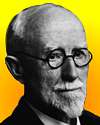 (source)
(source)
|
Sir William Cecil Dampier
(27 Dec 1867 - 11 Dec 1952)
English physicist, agriculturalist and science historian who developed a method of extracting milk sugar from the surplus whey when World War I caused a cheese shortage in Britain.
|
Science Quotes by Sir William Cecil Dampier (16 quotes)
Animals live either on plants or on each other, and so all are ultimately dependent on the energy of the Sun.
— Sir William Cecil Dampier
In A Shorter History of Science (1944), 118.
At first men try with magic charms
To fertilize the earth,
To keep their flocks and herds from harm
And bring new young to birth.
Then to capricious gods they turn
To save from fire or flood;
Their smoking sacrifices burn
On altars red with blood.
Next bold philosopher and sage
A settled plan decree
And prove by thought or sacred page
What Nature ought to be.
But Nature smiles—a Sphinx-like smile
Watching their little day
She waits in patience for a while—
Their plans dissolve away.
Then come those humbler men of heart
With no completed scheme,
Content to play a modest part,
To test, observe, and dream.
Till out of chaos come in sight
Clear fragments of a Whole;
Man, learning Nature’s ways aright
Obeying, can control.
To fertilize the earth,
To keep their flocks and herds from harm
And bring new young to birth.
Then to capricious gods they turn
To save from fire or flood;
Their smoking sacrifices burn
On altars red with blood.
Next bold philosopher and sage
A settled plan decree
And prove by thought or sacred page
What Nature ought to be.
But Nature smiles—a Sphinx-like smile
Watching their little day
She waits in patience for a while—
Their plans dissolve away.
Then come those humbler men of heart
With no completed scheme,
Content to play a modest part,
To test, observe, and dream.
Till out of chaos come in sight
Clear fragments of a Whole;
Man, learning Nature’s ways aright
Obeying, can control.
— Sir William Cecil Dampier
Epigraph in A History of Science and Its Relation with Philosophy & Religion (1968), vi.
But beyond the bright searchlights of science,
Out of sight of the windows of sense,
Old riddles still bid us defiance,
Old questions of Why and of Whence.
Out of sight of the windows of sense,
Old riddles still bid us defiance,
Old questions of Why and of Whence.
— Sir William Cecil Dampier
from Recent Development of Physical Science (p. 10)
Great discoveries are made accidentally less often than the populace likes to think.
— Sir William Cecil Dampier
Referring to the accidental discovery of X-rays, in A History of Science and Its Relations with Philosophy and Religion (1931), 382.
In early times, when the knowledge of nature was small, little attempt was made to divide science into parts, and men of science did not specialize. Aristotle was a master of all science known in his day, and wrote indifferently treatises on physics or animals. As increasing knowledge made it impossible for any one man to grasp all scientific subjects, lines of division were drawn for convenience of study and of teaching. Besides the broad distinction into physical and biological science, minute subdivisions arose, and, at a certain stage of development, much attention was, given to methods of classification, and much emphasis laid on the results, which were thought to have a significance beyond that of the mere convenience of mankind.
But we have reached the stage when the different streams of knowledge, followed by the different sciences, are coalescing, and the artificial barriers raised by calling those sciences by different names are breaking down. Geology uses the methods and data of physics, chemistry and biology; no one can say whether the science of radioactivity is to be classed as chemistry or physics, or whether sociology is properly grouped with biology or economics. Indeed, it is often just where this coalescence of two subjects occurs, when some connecting channel between them is opened suddenly, that the most striking advances in knowledge take place. The accumulated experience of one department of science, and the special methods which have been developed to deal with its problems, become suddenly available in the domain of another department, and many questions insoluble before may find answers in the new light cast upon them. Such considerations show us that science is in reality one, though we may agree to look on it now from one side and now from another as we approach it from the standpoint of physics, physiology or psychology.
But we have reached the stage when the different streams of knowledge, followed by the different sciences, are coalescing, and the artificial barriers raised by calling those sciences by different names are breaking down. Geology uses the methods and data of physics, chemistry and biology; no one can say whether the science of radioactivity is to be classed as chemistry or physics, or whether sociology is properly grouped with biology or economics. Indeed, it is often just where this coalescence of two subjects occurs, when some connecting channel between them is opened suddenly, that the most striking advances in knowledge take place. The accumulated experience of one department of science, and the special methods which have been developed to deal with its problems, become suddenly available in the domain of another department, and many questions insoluble before may find answers in the new light cast upon them. Such considerations show us that science is in reality one, though we may agree to look on it now from one side and now from another as we approach it from the standpoint of physics, physiology or psychology.
— Sir William Cecil Dampier
In article 'Science', Encyclopedia Britannica (1911), 402.
In spite of ignorance, folly and passion, the scientific method has won field after field since the days of Galileo. From mechanics it passed to physics, from physics to biology, from biology to psychology, where it is slowly adapting itself to unfamiliar ground.
— Sir William Cecil Dampier
from A History of Science and Its Relations with Philosophy and Religion (1929, 4th Ed., 1948), 500.
In the absorption spectrum of chlorophyll the maximum absorption coincides with the maximum energy of the solar spectrum, a remarkable adaptation, however produced, of means to ends.
— Sir William Cecil Dampier
In A Shorter History of Science (1944), 118.
It is impossible to predict the velocity of a particular molecule or the length of life of an individual man, but with a sufficient number of molecules or men we can deal with them statistically and say how many will move within certain velocities or how many will die within a given year. Statistical determination, but individual uncertainty.
— Sir William Cecil Dampier
In A Shorter History of Science (1944), 96.

It seemed as though the main framework had been put together once and for all, and that little remained to be done but to measure physical constants to the increased accuracy represented by another decimal point.
— Sir William Cecil Dampier
A History of Science and Its Relations with Philosophy and Religion (1931), 882.
Science did not germinate and grow on a healthy prairie of ignorance but in a noisome jungle of magic and superstition, which again and again choked the seedlings of knowledge.
— Sir William Cecil Dampier
In A Shorter History of Science (1944), 5.
The dawn of the modern world was breaking in the era of the Renaissance before natural science took its stand on the firm ground of slowly won observation. Then, ceasing to be speculative philosophy, tossed about by every wind of doctrine, it became an independent and progressive branch of knowledge, developed by the healthy interaction of inductive observation and deductive reasoning.
— Sir William Cecil Dampier
In Science and the Human Mind: A Critical and Historical Account of the Development of Natural Knowledge (1912), 7. Co-authored with Catherine Durning Whetham (his wife).
The fundamental concepts of physical science, it is now understood, are abstractions, framed by our mind, so as to bring order to an apparent chaos of phenomena.
— Sir William Cecil Dampier
From Preface, A History of Science and its Relations with Philosophy & Religion (1931), vii.
The mathematician lives in a purely conceptual sphere, and mathematics is but the higher development of Symbolic Logic.
— Sir William Cecil Dampier
In Recent Development of Physical Science (1904), 34. The second half of the sentence appears in Robert Édouard Moritz, Memorabilia Mathematica (1914), 206.
There is only one nature—the division into science and engineering is a human imposition, not a natural one. Indeed, the division is a human failure; it reflects our limited capacity to comprehend the whole.
— Sir William Cecil Dampier
from Recent Development of Physical Science (p. 10)
There seems no limit to research, for as been truly said, the more the sphere of knowledge grows, the larger becomes the surface of contact with the unknown.
— Sir William Cecil Dampier
from A History of Science and Its Relations with Philosophy and Religion (1929, 4th Ed., 1948), 500.
To the behaviourist a man is only a nexus of stimuli and responses, because the method of investigation, by its own definitions and axioms, is merely the study of the relations between stimuli and responses.
— Sir William Cecil Dampier
In A Shorter History of Science (1944), 137.
See also:
- 27 Dec - short biography, births, deaths and events on date of Dampier's birth.
- A history of science and its relations with philosophy & religion, by Sir William Cecil Dampier. - book suggestion.
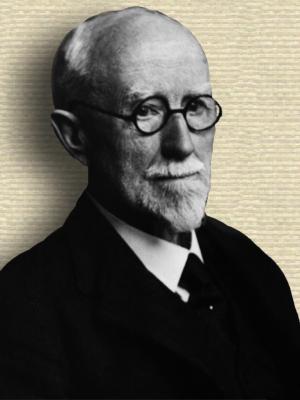

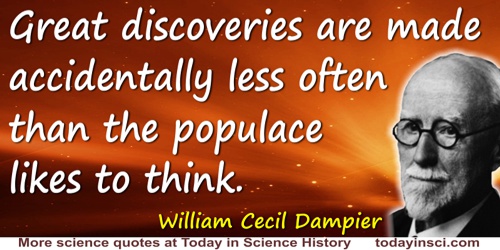

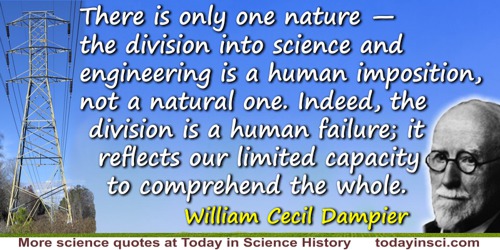
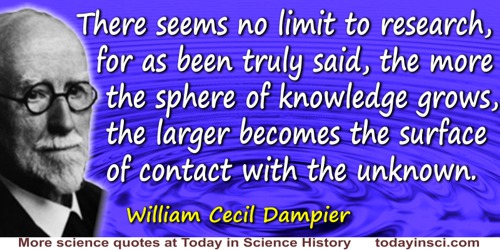


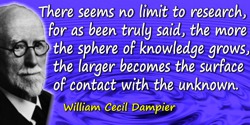
 In science it often happens that scientists say, 'You know that's a really good argument; my position is mistaken,' and then they would actually change their minds and you never hear that old view from them again. They really do it. It doesn't happen as often as it should, because scientists are human and change is sometimes painful. But it happens every day. I cannot recall the last time something like that happened in politics or religion.
(1987) --
In science it often happens that scientists say, 'You know that's a really good argument; my position is mistaken,' and then they would actually change their minds and you never hear that old view from them again. They really do it. It doesn't happen as often as it should, because scientists are human and change is sometimes painful. But it happens every day. I cannot recall the last time something like that happened in politics or religion.
(1987) -- 


